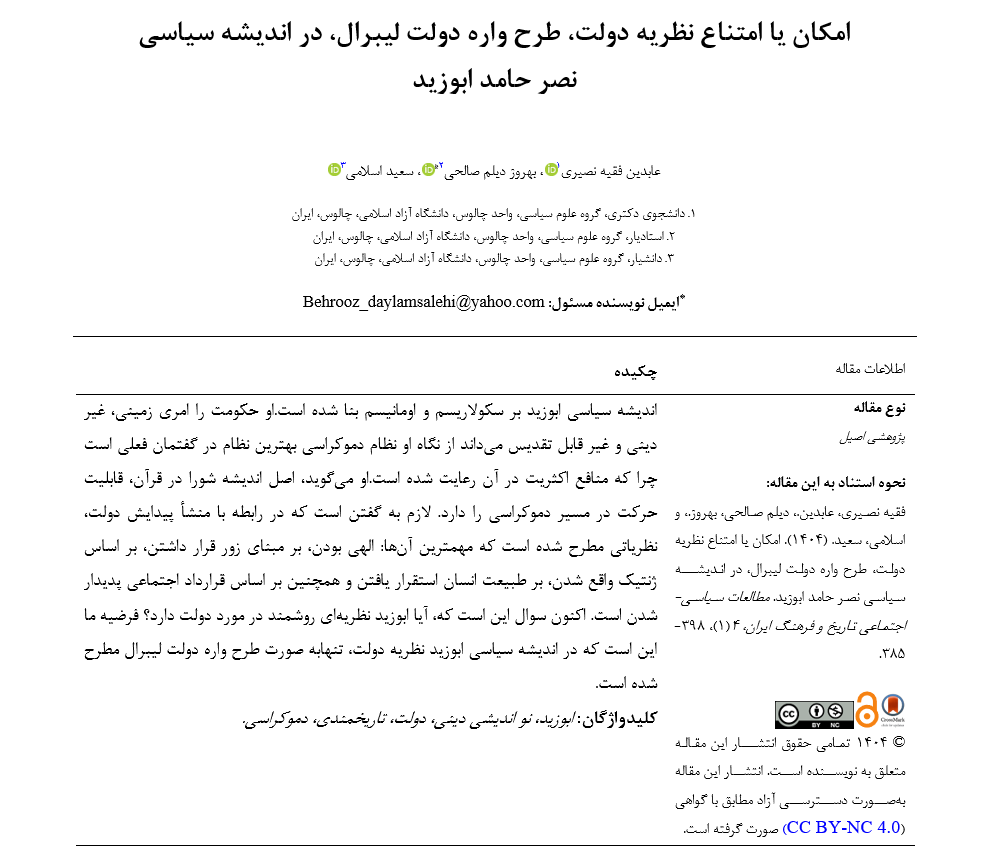The Possibility or Impossibility of a Theory of the State: The Liberal State Schema in the Political Thought of Nasr Hamid Abu Zayd
Keywords:
Abu Zayd, religious reformism, state, historicity, democracyAbstract
The political thought of Abu Zayd is founded upon secularism and humanism. He views government as a worldly, non-religious, and non-sacred phenomenon. From his perspective, democracy represents the most appropriate system within the current discourse, as it safeguards the interests of the majority. He asserts that the principle of shura (consultation) in the Qur’an possesses the capacity to evolve along the path of democracy. It should be noted that several theories have been proposed regarding the origin of the state, the most prominent of which include: divine creation, coercive foundation, genetic determinism, establishment based on human nature, and emergence through the social contract. The present question, therefore, is whether Abu Zayd formulated a systematic theory of the state. Our hypothesis is that within Abu Zayd’s political thought, the theory of the state appears only in the form of a schema of the liberal state.
Downloads
References
Abouzeid, N. H. (2004). Critique of Religious Discourse. Yadavaran.
Abouzeid, N. H. (2016). Muhammad (PBUH) and the Verses of God: The Quran and the Future of Islam. Scientific Publishing.
Abouzeid, N. H. (2017). Modernization, Sanction, and Interpretation: From Scientific Understanding to Fear of Takfir. Nashr-e Ney.
Alikhani, A. A. (2004). The Islamic World and the West: The View of Nasr Hamid Abouzeid. Middle Eastern Studies(37), 119-140.
Bagheri Kia, H. (2015). Comparative Explanation of the Philosophical Foundations of the Traditional Approach of Seyyed Hossein Nasr and the Modern Approach of Nasr Hamid Abouzeid in the Pathology of Religious Education. Journal of Research on Foundations of Education(1), 104-122.
Bashirieh, H. (2016). Teaching Political Knowledge (Foundations of Theoretical and Foundational Political Science). Contemporary Look Publishing.
Firahi, D. (2001). Political System and Government in Islam (1): The General Features of Political System and Government in Islam. Political Science - Baqir al-Olum University(14), 139-164.
Hamedi, S. M. (2007). The Influence of Dr. Nasr Hamid Abouzeid by Orientalists. Journal of Quranic Studies by Orientalists(2), 157-192.
Jafari, A. (2011). Post-Rationalist Theories in International Relations. Zeytun-e Sabz Publications.
Kheirjou, S. (2018). Analysis and Critique of Dr. Nasr Hamid Abouzeid's Epistemology of Revelation from the Perspective of Allameh Tabatabai. Journal of Philosophy of Religion Studies(16), 15-33.
Mansourzadeh, M. B., & Masoud, Z. (2017). Examining the Foundations of Political Thoughts Among Neo-Mu'tazilites with Emphasis on the Views of Nasr Hamid Abouzeid. Political Science - Tarbiat Modares University(13), 37-50.
Nasri, A. (2002). Abouzeid and Textual Interpretation in the Historical Horizon. Journal of Qabsat(23), 94-105. https://doi.org/10.1177/153660060202300202
Poladi, K. (2015). History of Political Thought in Iran and Islam. Markaz Publishing.
Pourpirar, N. (2002). A Critique of 'The Meaning of the Text' by Nasr Hamid Abouzeid: The Birth of a New Interpretation. Journal of Golestan Quran(119), 31-37.
Raeisian, G. R., & Zend Aghghati, F. (2017). Pathology of Proving the Historical Nature of the Quran in the Works of Nasr Hamid Abouzeid. Journal of Hasna(33), 8-33.
Sajadi, Z. (2015). Examining and Critiquing Nasr Hamid Abouzeid's View on the Essence of Quranic Revelation. Quranic and Ahl al-Bayt Studies, 1(2), 63-84.
Taheri Kal Keshvandi, M., & Bozouri Nejad, Y. (2016). Exploring the Interpretive Approach of Nasr Hamid Abouzeid in Reading Religious Texts. Journal of Contemporary Muslim Thought Studies(3), 81-92.
Vaezi, A. (2010). A Critique of Nasr Hamid Abouzeid's Concept of the Historicity of the Quran. Quranic Studies(6), 41-64.

Downloads
Published
Submitted
Revised
Accepted
Issue
Section
License
Copyright (c) 2025 Aabedin Faghih Nasiri (Author); Behrooz Daylam Salehi (Corresponding Author); Saeed Eslami (Author)

This work is licensed under a Creative Commons Attribution-NonCommercial 4.0 International License.







